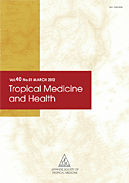Severe Acute Respiratory Syndrome (SARS) has rapidly spread and caused epidemics in many countries. During these epidemics, the Japanese government contributed to SARS control by dispatching medical teams. In the present article, the author reviews and discusses the process of control of the SARS outbreak based on experiences in activities to support SARS control in Vietnam and China.
Vietnam succeeded in the effective control of SARS for the first time in the world. This was accomplished by complete isolation of patients and implementation of nosocomial infection control from an early stage of epidemic, etc. In China, due to inadequate response in the early stage, nosocomial infection occurred frequently and the disease quickly spread. However, later, effective actions were taken under the strong direction of the government, and the disease was finally put under control. The Japan Medical Team for Disaster Relief dispatched by the government of Japan to Hanoi, Vietnam and Beijing, China offered cooperative activities for the prevention of nosocomial infection and respiratory management. In addition, the Medical Aid Team sent to Guangdong Province in China provided guidance to the local Japanese residents to prevent the infection of SARS and to alleviate anxiety about the disease.
In the control of SARS, it is essential to take adequate actions from an early stage in the development of the disease. For this purpose, rather than starting measures for the control of nosocomial infection after the eruption of the disease, it is important to train medical staff on a routine basis, to establish a nosocomial infection control system, and to consolidate basic preventive practices.
抄録全体を表示
